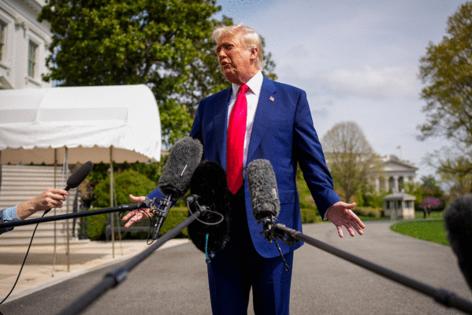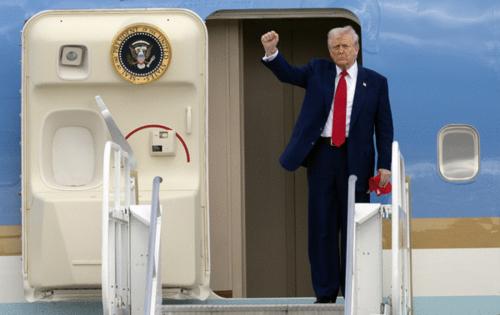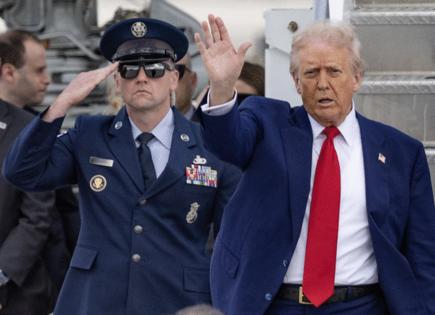'No pain': Trump team doubles down on tariffs as global markets plummet
Published in Political News
WASHINGTON — The White House doubled down Thursday on President Donald Trump’s sweeping worldwide tariffs, as he slapped stiff duties on unexpected allies and threatened an economic upheaval that could put Republicans’ House and Senate majorities at risk next year.
As Marine One lifted the president skyward from the White House South Lawn, American, Asian and European stock markets were heading in the opposite direction. The Dow Jones, S&P 500 and NASDAQ all were down significantly as trading neared the day’s end.
The announced import fees were higher and broader than expected, setting off a global selloff as Trump headed to his Miami golf club for a LIV Golf tour dinner ahead of the Saudi-funded league’s tournament there this weekend.
Departing the White House, Trump contended that the first full day of the tariffs were “going very well,” predicting without any supporting data that the U.S. would “have $6 or $7 trillion dollars coming into our country” and that “the markets are gonna boom.”
U.S. lawmakers and economic analysts spent much of the day trying to figure out how the tariffs would work and to gauge their full impact. Trump, during a chilly Rose Garden announcement ceremony on Wednesday, brought a number of traditional allies such as Israel and Saudi Arabia into his sweeping worldwide tariff plan, as he touted his “promises made and promises kept.”
But like many of his other second-term moves, the import fees go well beyond his campaign trail rhetoric. The severe duties have unnerved stock markets and raised new questions about next year’s midterm elections, especially as Democrats have picked up steam in recent special and judicial elections, with narrower-than-usual margins in deep-red areas.
Trump and his top aides on Thursday downplayed the immediate blow to stock markets, describing the tariffs as necessary to right decades of trade wrongs and to fundamentally remake the U.S. economy into one based largely on manufacturing.
Earlier in the day, Trump cast his severe tariffs as a successful medical procedure.
“THE OPERATION IS OVER! THE PATIENT LIVED, AND IS HEALING,” he said on social media. “THE PROGNOSIS IS THAT THE PATIENT WILL BE FAR STRONGER, BIGGER, BETTER, AND MORE RESILIENT THAN EVER BEFORE. MAKE AMERICA GREAT AGAIN!!!”
Trump administration officials have asserted that the tariffs would force companies to move production operations to the United States. But doing so would take years.
The president, at his Rose Garden announcement ceremony Wednesday, called a Detroit-area autoworker named Brian onstage. Once behind the blue presidential lectern, Brian told the audience that all his life, he had watched “plant after plant after plant in Detroit and in the metro Detroit area close.”
“There are now plants sitting idle,” he said, wearing a Trump visor. “There are now plants that are underutilized, and Donald Trump’s policies are going to bring production back into those underutilized plants. There’s going to be new investment.”
Yet, a few minutes later, Trump, a former real estate mogul and self-described “builder president,” suggested some factories would be razed and new ones erected. Such projects often take a long time, raising questions about how quickly companies like Ralph Lauren, which saw its stock plummet Thursday, could reasonably move production operations stateside.
“What you’re going to see is … factories that are falling down, those factories will be knocked down, and they’re going to have brand new factories built in their place,” he said. “And not only talking about renovating, they’re talking about brand new, the best anywhere in the world, the biggest anywhere in the world.
“I have a friend who builds car plants, and I said, ‘I want to see the biggest and the best,’” Trump said Wednesday. “He said, ‘Well, we have to go to Mexico.’ I said, ‘No, I want to see it in the United States.’”
‘He’s delivering’
That could mean companies would have to maintain current production lines and pay the import fees while building new factories in the U.S. Analysts and lawmakers say those companies would then pass along the increased costs to consumers by raising prices in stores and online.
Contradicting what her boss has said publicly multiple times, Trump’s top spokesperson, Karoline Leavitt, contended Thursday in an interview with NewsNation that “there’s not going to be any pain for American-owned companies and American workers.” In contrast, Agriculture Secretary Brooke Rollins told reporters at the White House that she expected “a short time of uncertainty, and then we’ll move back to the prosperity that this president has envisioned.”
Vice President JD Vance, who has at times espoused foreign policy views even more isolationist than Trump, said in a Fox News interview that the president was “taking this economy in a different direction,” adding: “He ran on that. He promised it. And now, he’s delivering.”
On the campaign trail, candidate Trump did indeed talk a lot about trade and tariffs. He criticized China and signaled he was not happy with how U.S. allies such as Canada, Mexico and the European Union had treated American-made goods and companies. He did not, however, use his political rallies to threaten to slap tariffs on allies such as Israel, Saudi Arabia, Switzerland, North Macedonia, Jordan, New Zealand, Qatar and many others.
The list of “reciprocal tariffs” released by the White House in an eight-page handout even included some places that are not independent countries, such as Gibraltar, Reunion and the uninhabited — unless you count the penguins — Heard and McDonald Islands.
Notably, while the White House has pinned blame on others countries’ trade practices, Trump and Vance also contend that the actions — or lack thereof — of former presidents forced them to implement the new import fees.
“For 40 years, we have gone down that pathway. We’ve seen closing factories. We’ve seen rising inflation. We’ve seen the cost of housing so high that most Americans can’t afford to buy a home right now,” Vance told Fox News. “And yes, this is a big change. I’m not going to shy away from it. … We cannot keep going down the Joe Biden globalist pathway, where we have $2 trillion of peacetime debt and deficits. We have manufacturing disappearing. That is not working for Americans.”
A day earlier, Trump said he didn’t blame other countries for their trade policies: “I think they’re very smart in doing it.”
But pointing from the Rose Garden, he added, “I blame the people that sat right in that Oval Office right over there, right behind the Resolute Desk or whichever desk they chose.”
‘Greater uncertainty’
Some world leaders on Thursday had no problem blaming Trump as they warned of a global economic slowdown, and possibly a worldwide recession.
“From greater uncertainty to the disruption of supply chains to burdensome bureaucracy, the cost of doing business with the United States will drastically increase,” European Commission President Ursula von der Leyen said. “There seems to be no order in the disorder.”
Back home, some GOP lawmakers defended the president even amid speculation his actions could cost the party its full control of Congress next year.
“All the president is saying at the core is we need to level the playing field for our manufacturers and producers and stop suppressing wages with this unfair trade order that exists today,” House Budget Chair Jodey C. Arrington, R-Texas, told CNBC. “It will help build back the manufacturing base, which I think is good for the country and good for the economy.”
But Democrats on Thursday were already using the sweeping duties to target vulnerable House Republicans.
“Donald Trump’s destructive tariffs are causing price hikes and already tanking the economy, and Mike Lawler owns every bit of this reckless trade war that is hurting New Yorkers,” the Empire State Democratic Party said in a statement, referring to the two-term Republican who holds a district Kamala Harris carried last fall. “The Lawler-backed tariffs will increase costs for families by thousands of dollars and put the jobs of over 280,000 New Yorkers at risk.”
Vance, however, suggested he was not thinking about midterm politics.
“I’m not focused on the midterm elections in 2026, much less the presidential election in 2028,” he told Fox News when asked about his presidential ambitions. “But the way that I think about it is: If we do a good job, the politics [will] take care of themselves.”
_____
(Niels Lesniewski contributed to this report.)
_____
©2025 CQ-Roll Call, Inc., All Rights Reserved. Visit cqrollcall.com. Distributed by Tribune Content Agency, LLC.



































































Comments